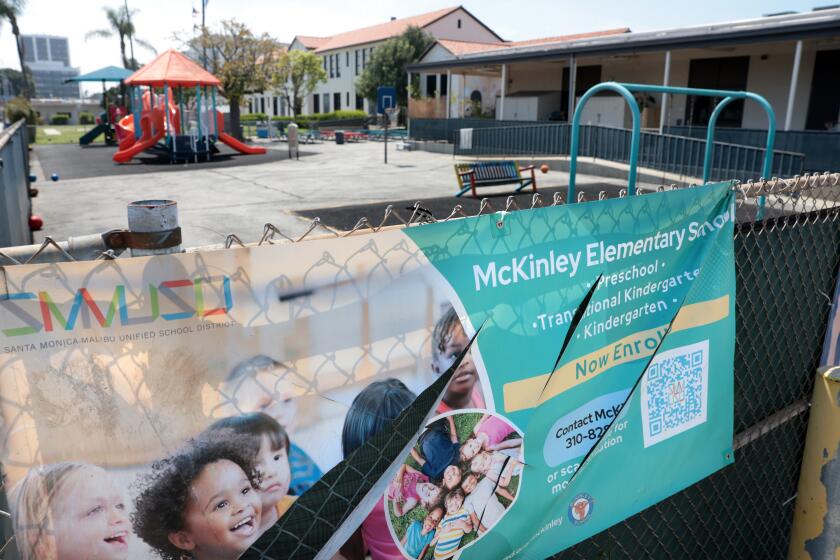One tough assignment: Settle homework beef
The grumbling reaches fever pitch at many schools this time of year. The semester is nearing its end and homework assignments are piling up -- just as the winter break is about to begin. Parents of school kids know what that means:
Their children will be lugging loaded backpacks on ski vacations and ditching family dinners to finish school projects. Not even on holiday, it seems, can a kid escape the homework demons.
But in upscale San Marino, the private commiseration of some parents has become an aggressive public campaign, mounted by a mother obsessed with the notion that homework is wrecking family relationships and turning children into automatons.
“They’re making me out to be a homework-hater,” said Tracy Mason, a former accountant, now stay-at-home mom of a Huntington Middle School sixth-grader. “All I’m saying is, this is a big burden on families. We want [the district] to justify it.”
Mason has spent months poring over studies, interviewing experts and bombarding parents and school officials with research that suggests that homework contributes little to students’ academic prowess. She wants San Marino district officials to study the issue and consider limiting the amount of work teachers can give.
Her aggressive effort has inspired some parents and annoyed others. And it has revealed an uncomfortable cultural breach in one of the state’s most successful school districts, where 70% of the students are Asian American and high test scores are considered a ticket to the Ivy League.
“They’re willing to make everybody miserable with hours of homework,” Mason said, “and as long as test scores are going up, nobody cares.”
When I spoke with Mason this week, she was in the car, hustling her daughter to an after-school grammar tutoring session. Twice a week, $50 an hour. She winces every time she writes a check.
Tutoring has become a lightning rod in the brewing homework debate, stoking resentment among parents, who say it reflects an unhealthy fixation on grades and handicaps students who do their homework the old-fashioned way.
In my conversations with middle-school moms -- almost all of them white -- it was clear where many place the blame: Hyper-competitive Chinese parents are raising the bar too high, to ensure that their children succeed, they said.
Few will say that for the record, of course. Never mind the racial sensitivity; no one wants their kid deemed a slacker in a high-flying district like this.
The ethnic rift is not surprising in a system pushed into overdrive by waves of immigrants from Hong Kong and Taiwan, whose nose-to-the-grindstone academic focus has helped San Marino High rank among the nation’s top 100 high schools, according to U.S. News and World Report.
Asian parents have been quiet during the homework debate, but don’t like being cast as villains, said Dora Liang, the mother of a high school student.
“To say Asians dictate the policy is not true,” Liang said. She acknowledged that many Chinese parents hire tutors, some because they don’t understand English well enough to help their children with homework and others because “the curriculum is not challenging enough. They do it to have a competitive edge.
“People come to San Marino because of the quality of the schools and how it affects the property values, whether they’re Asian or non-Asian,” Liang said. “If you feel strongly that the homework is too much, you have the option of telling your kids not to do it.”
Of course, it’s not that simple. Parents may believe that the homework grind is producing stressed-out, joyless, uncreative kids, but they don’t want theirs to be left behind.
Still, it’s no surprise to me that concerns emerge in middle school, where the homework load increases and children must adjust to a procession of teachers. I don’t envy San Marino officials, caught between competing perceptions and value systems.
Supt. Gary Woods said parent surveys make the dilemma clear: “Fifty percent of parents here think we give too much homework,” he said. “And 50% think we give too little. . . . This is a conversation that has gone on since my days as a high school English teacher 21 years ago.”
But it does no good to haul out the “back in my day . . .” speech in this debate. Schools live and die by test scores today. “We have to get all our students to an advanced level,” Woods said. “And we only have so much class time to do it.”
Even those parents who are grumbling admit that San Marino’s academic success has paid dividends, keeping their property values high and the real estate market strong, even in today’s slowdown.
Still, some told me they are quietly checking out private schools -- including Mason, who moved to San Marino from Irvine in part because the schools were good.
“I’m lobbying my husband now . . . If it’s not going to be fixed in my daughter’s school years, let’s just bail,” she said.
The irony is impossible to miss. People move to San Marino because the schools are so good, then leave the school district because the homework is so hard.
--



